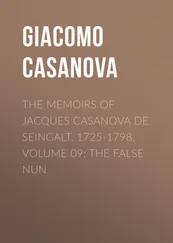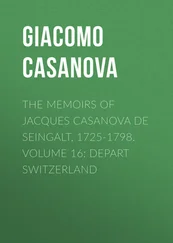Sandor Marai
Casanova in Bolzano
Given the appearance and behavior of my hero, the reader will no doubt identify the characteristic profile of that notorious eighteenth-century adventurer, Giacomo Casanova.
To identify, for some people, is to accuse, and it is not easy to mount a defense. My hero bears an unfortunate resemblance to that homeless, desperately roguish, and generally unhappy itinerant who, at midnight on October 31, 1756, escaped from the cells under the lead-roof ducal palace, the so-called Leads, let himself down into the lagoon by a rope ladder, and, with the help of an unfrocked friar called Balbi, fled the territory of the republic and took the road to Munich. My excuse is that it was not so much the romantic episodes in my hero’s life that interested me as his romantic character.
For this reason, the only details I have taken from the infamous Memoirs concern the time and circumstances of his escape. Everything else the reader comes across is fable and invention.
S.M.
I t was at Mestre he stopped thinking; the dissolute friar, Balbi, had very nearly let the police get wind of him, because he had looked for him in vain as the mail coach set off, and only found him after a diligent search, in a coffeehouse, where he was blithely sipping a cup of chocolate and flirting with the waitress. By the time they reached Treviso their money was gone; they sneaked through the gates dedicated to St. Thomas, into the fields, and, by creeping along the backs of gardens and skirting the woods, managed to reach the outskirts of Valdepiadene about dawn. Here he took out his dagger, thrust it under the nose of his disgusting companion, and told him they’d meet again in Bolzano: then they parted. Father Balbi slunk off in a bad mood through a grove of olives, brushing past their bare trunks, a shabby, slovenly figure disappearing into the distance, casting the odd sullen look behind him, like a mangy dog dismissed by his master.
Once the friar had finally gone, he made for the central part of town and with a blind, sure instinct sought accommodation at the residence of the captain of the local militia. The captain’s wife, a mild-mannered woman, received him, gave him supper, had his wounds cleaned — congealed blood was sticking to his knees and ankles, from the scraping he had given them when he had leaped off the lead roof — and, before falling asleep, he learned that the captain happened to be away searching for an escaped prisoner. He stole out in the early dawn and made a few more miles. He slept over in Pergine, and, three days later, arrived — by coach this time, having extorted six gold pieces from an acquaintance — in Bolzano.
Balbi was there waiting for him. They took rooms at The Stag. He had neither baggage nor topcoat and was ragged on arrival, rags being all that remained of his finecolored silk suit. A harsh November wind was already snapping at the narrow streets of Bolzano. The innkeeper nervously examined his tattered guests.
“The finest rooms?” he stuttered.
“The finest,” came the quiet but firm answer. “And look to your kitchen staff. You tend to cook everything in rancid fat rather than in oil in these parts, and I haven’t had a decent meal since leaving the republic! I want capon and chicken tonight, not one but three, with chestnuts. And get some Cyprus wine while you’re at it. Are you staring at my clothes? Wondering why we have arrived without any luggage, empty handed? Don’t you get news here? Don’t you read the Leyden Gazette ? Nincompoop!” he shouted in a cracked voice, having caught a chill on his journey, his windpipe seized by agonized coughing. “Have you not heard that a Venetian nobleman and his servants were robbed on the frontier? Have the police not been round yet?”
“No sir,” answered the frightened innkeeper.
Balbi sniggered into his sleeve. They were eventually shown to the finest rooms: a parlor with two big casement windows giving onto the main square, furniture with gilded legs and a Venetian glass above the fireplace. There was a French four-poster in the bedchamber. Balbi’s room was at the end of the corridor, at the foot of steep and narrow stairs that led to the servants’ quarters. The accommodation was greatly to his satisfaction.
“My secretary,” he said to the innkeeper, indicating Balbi.
“The police are very strict,” apologized the innkeeper. “They’ll be here any moment. They register all visitors.”
“Tell them,” he carelessly answered, “that you have a nobleman as guest. A gentleman…”
“Indeed!” enthused the innkeeper, now humble and curious, bowing deeply, his tasseled cap in his hand.
“A gentleman from Venice!” he affirmed.
He pronounced this as though it were some extraordinary title or rank. Even Balbi pricked up his ears at the tone of his voice. Then he wrote his name in a precise and expert hand in the guest book. The innkeeper was red with excitement: he wiped his temples with a fat finger and couldn’t make up his mind whether to run to the police station or to go down on his knees and kiss the man’s hand. Being undecided he simply stood there in silence.
Eventually he lit a lantern and escorted his guests up the stairs. The servants were busying themselves about the apartment: they brought large gilt candlesticks, warm water in a silver jug, and canvas towels manufactured in Limburg. The visitor undressed slowly, in regal fashion, like a king at his toilette. He handed his filthy garments one by one to the innkeeper and his servants, his blood-bespotted silk pantaloons having to be cut away on both sides with scissors because they were sticking to him, and then soaked his feet in a silver bowl full of water while leaning back in an armchair, matted and solemn, almost faint with exhaustion. At certain points he dropped into sleep, mumbled, and cried out. Balbi, the innkeeper, and the servants came and went about him with open mouths, making up the bed in the chamber, drawing the curtains, and snuffing out almost all the candles. They had to knock at his door for some time when it came to supper. As soon as he had eaten he fell fast asleep, and remained sleeping till noon the next day, his face smooth and untroubled, as indifferent as a day-old corpse.
“A gentleman,” said the girls, giggling, whispering, and singing as they went about their tasks in the kitchen and the cellar, washing cutlery, wiping plates, chopping up firewood, serving in the bar, now talking in low voices with fingers held to their mouths, now giggling again, eventually calming down, and passing on the news officiously then laughing: a gentleman, yes, a gentleman, from Venice. In the evening two men from the secret service appeared, drawn by his name, that name so notorious and irresistible, so dangerous and fascinating, a name redolent of adventures and flight, a name that attracted the secret service in whatever town it appeared. And they wanted to know everything about him. Is he asleep?… Has he no luggage?
“A dagger,” replied the innkeeper. “He arrived with a dagger. That is his sole possession.”
“A dagger,” they repeated, nodding vigorously, bemused. “What kind of dagger?” the secret service men inquired.
“A Venetian dagger,” answered the innkeeper, in awed tones.
“Nothing else?” they insisted.
“Nothing,” the innkeeper said. “Nothing but a dagger. That’s all he has.”
The information took the secret service men by surprise. They would not have been amazed to find that he had arrived bearing loot: precious stones, spirits, necklaces, and rings that he had slipped off the fingers of innocent women as he traveled. His reputation preceded him like a herald announcing his name. The prelate had already sent word to the police chief that morning, requesting the force to send the notorious guest on his way. That same morning, and after mass in the evening, the taverns of Tyrol and Lombardy were full of tales of his escape.
Читать дальше












